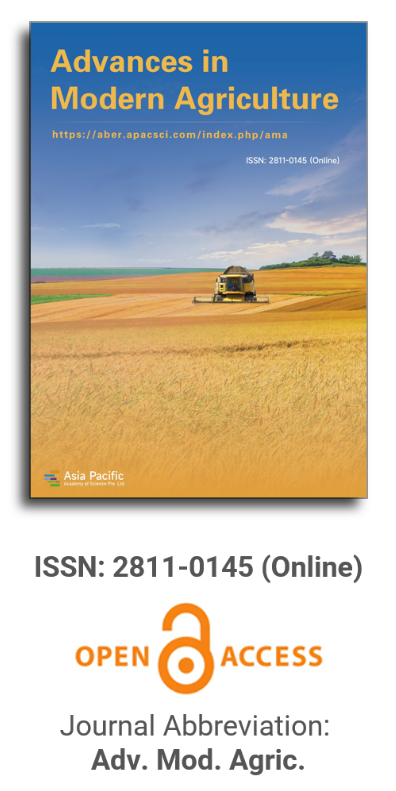


Towards high-yield and sustainable agriculture
Vol 4, Issue 2, 2023
VIEWS - 3103 (Abstract)
Download PDF
Abstract
The key challenges for researchers in agriculture today may be how to guarantee the quality of various crops and how to efficiently increase agricultural yields. Volume 4, Issue 2, of this open access journal, Advances in Modern Agriculture, which features 12 excellent articles, primarily offers readers an engaging conversation about how to increase agricultural productivity through the use of various research approaches from multiple perspectives. In the meantime, insightful recommendations regarding how to enhance crop productivity are made, offering researchers working in related fields helpful knowledge and illumination.
References
- Osuji EE, Tim-Ashama AC, Agunanne UT, et al. Understanding factors intercepting response of rice farmers to climate change in Ebonyi State, Nigeria. Advances in Modern Agriculture 2023; 4(2): 2285. doi: 10.54517/ama.v4i2.2285
- Wikipedia. Fertilizer (Chinese). Available online: https://zh.wikipedia.org/wiki/%E8%82%A5%E6%96%99 (accessed on 10 June 2023).
- Amanullah A, Khan U. Advancing sustainable agriculture with beneficial microbes: Enhancing crop growth and yield for food security and human health. Advances in Modern Agriculture 2023; 4(2): 2426. doi: 10.54517/ama.v4i2.2426
- Mutetwa M, Mtaita T, Ngezimana W, Chaibva P. Growth of horned melon (Cucumis metuliferus) under different levels of Trichoderma-based bio-fertilizer. Advances in Modern Agriculture 2023; 4(2): 2367. doi: 10.54517/ama.v4i2.2367
- Rao GBN. Applications of artificial intelligence in precision agriculture to ameliorate production and distribution. Advances in Modern Agriculture 2023; 4(2): 2374. doi: 10.54517/ama.v4i2.2374
Supporting Agencies
Copyright (c) 2023 Gideon Oron
License URL: https://creativecommons.org/licenses/by/4.0/

This site is licensed under a Creative Commons Attribution 4.0 International License (CC BY 4.0).

Prof. Zhengjun Qiu
Zhejiang University, China

Cheng Sun
Academician of World Academy of Productivity Science; Executive Chairman, World Confederation of Productivity Science China Chapter, China
Indexing & Archiving
In the realm of modern agriculture, the integration of cutting-edge technologies is revolutionizing the way we approach sustainable farming practices. A recent study published in Advances in Modern Agriculture titled "Classification of cotton water stress using convolutional neural networks and UAV-based RGB imagery" has garnered significant attention for its innovative approach to precision irrigation management. Conducted by researchers from Institute of Data Science and the AgriLife Research and Extension Center of Texas A&M University (authors's information is below). This study introduces a novel method for classifying cotton water stress using unmanned aerial vehicles (UAVs) and convolutional neural networks (CNNs), offering a powerful solution for optimizing water use in agriculture.
Modern agricultural technology is evolving rapidly, with scientists collaborating with leading agricultural enterprises to develop intelligent management practices. These practices utilize advanced systems that provide tailored fertilization and treatment options for large-scale land management.
This journal values human initiative and intelligence, and the employment of AI technologies to write papers that replace the human mind is expressly prohibited. When there is a suspicious submission that uses AI tools to quickly piece together and generate research results, the editorial board of the journal will reject the article, and all journals under the publisher's umbrella will prohibit all authors from submitting their articles.
Readers and authors are asked to exercise caution and strictly adhere to the journal's policy regarding the usage of Artificial Intelligence Generated Content (AIGC) tools.
Asia Pacific Academy of Science Pte. Ltd. (APACSCI) specializes in international journal publishing. APACSCI adopts the open access publishing model and provides an important communication bridge for academic groups whose interest fields include engineering, technology, medicine, computer, mathematics, agriculture and forestry, and environment.



.jpg)
.jpg)

.jpg)
